Our Nightmare Ride to Delhi on the Shanti Express
Life in India is like a mandala. So many pieces and parts, colorful and blending, fitting together in harmony in an ebb and flow of energy and stamina.
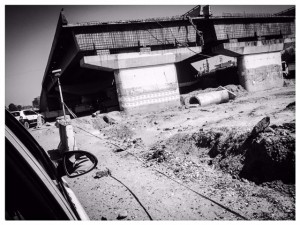
Nothing reflects that truth like a car ride on an Indian highway. The roads aren’t like the asphalt strips with which you may be familiar. They are ribbons of Earth and holes and dust — sometimes the roads cover miles made of tar. But always there is an abrupt ending, sometimes so sudden you have to screech to a halt to acknowledge them.
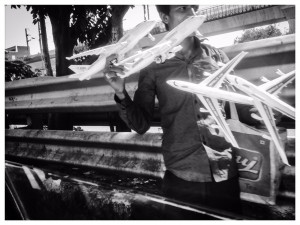
The road in India is also a place of commerce. A chance to sell toys or food or to beg for money inside the windows of stopped cars.
The gaps in the road are the kind of holes that make give your coccyx a new meaning in life. As the vehicle regretlessly slams your body to the ground without shock absorbers or any type of protection between you and the machine that carries you forth, your tailbone involuntarily stamps a circle in the sand, an ethereal moment of “Yes, I was here.”
We hired a car and driver to make it back to the country’s capital by lunch time.
We awoke to the sound of Sadus’ breath blowing through conch shells, their fingers laced over bells ringing in intervals. The music lured us out onto our balcony for one final look at Pushkar Lake before leaving for Delhi.
The driver greeted us at the hotel entrance in Pushkar. In the pitch black pre-dawn air, we only saw the glint of his eyes.
“Bonjour, ca va?”
We blinked, blinded by the darkness.
“Oui, ca va. Allons-y?”
Numbed by the early hours, we sat in the backseat, clutching our backpacks and wondering how long the ride would take.
The driver, who had introduced himself as Kamal and who had a French girlfriend (thus the greeting), tried to encourage our mood.
“You only need three things when travelling through India: Good brakes, good horn, good luck!”
It was only then that I observed his head periodically spitting brown juice out the window.
My well-travelled love explained:
“He’s chewing a stimulant to stay awake.”
It turns out he had been driving a young married couple since 10pm the night before. It was 5am and he had an eight-hour drive ahead of him.
He hadn’t slept a wink.
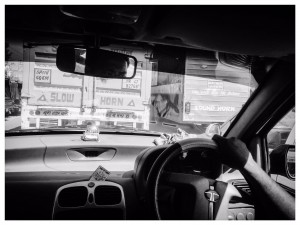
“Don’t worry, my dear,” my love assured me. “There’s so much to do while driving in India that he won’t fall asleep. Ever.”
Somehow I found his statement to be only vaguely reassuring. And I knew I wouldn’t be sleeping much either. In fact, I spent most of the eight-hour ride doing this:
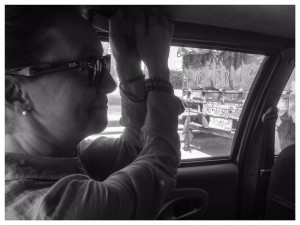
For the first two hours we drove in the dark, getting to know one another. I figured if we knew each other’s life
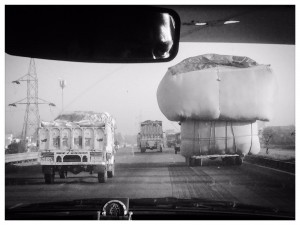
stories, perhaps even loosely, it would create a bond that would hold us together – and out of harm’s way – for the duration of our ride to Delhi. We stopped for chai and what passed for coffee at a roadside stop. As dawn broke, we fell into a comfortable silence.
That is until, in the span of sixty seconds somewhere between breakfast and the first thought that my bladder might burst, we witnessed the following amazements:
- a shepherd ushering a herd of cows across the entire six-lane highway crossing both directions;
- a troop of camels hauling firewood and galumphing their load serenely to our left (on said highway);
- a young child racing across three lanes to get to the other side;
- tuk-tuks filled with twenty people that any Western family of four would consider tight for their standards; and
- always, always, always the plea from trucks’ backsides to blow your horn.
Kamal got us to our hotel safely and in record time. He manoeuvred through potholes, toll booths, animal crossings and blinding sunlight. He is the only one working to support his entire extended family.
As I held on for dear life, I wondered if we were going to make it back in one piece. Occasionally, Kamal would spontaneously break out in song or chant something in Hindi. It sounded like a choral prayer and so I began to silently pray with him to the Shiva on his dashboard, then Jesus, Mohammed, Buddha and Whoever Else Was Listening. His job is dangerous and he is not able to say “no” to 2 am requests like ours for delivering tourists to their destinations.
“My family is counting on me.”
We thanked Kamal for his courage for getting us to the city in tact.
May the mandala of life continue its endless cycle of flowing energy and endurance.
It was an experience of a lifetime I won’t ever forget.
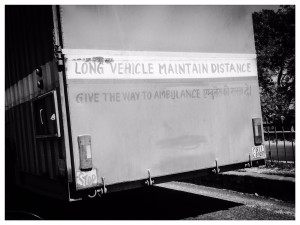
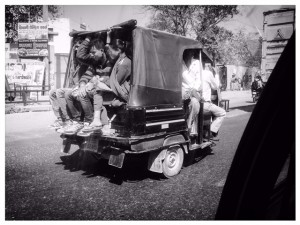
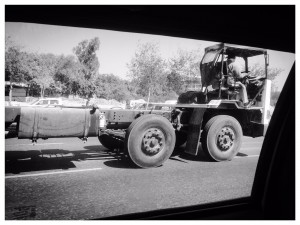
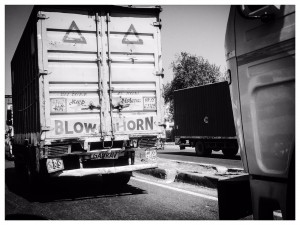
The insanity is about to end. – Power of Slow
November 30, 2017 at 1:49 pm[…] I traveled to Nepal and India. What others cultures have you experienced this year? […]